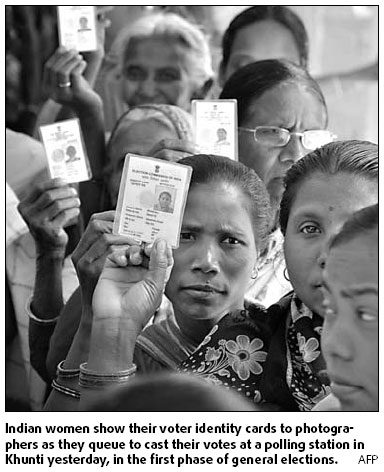India starts marathon election
VARANASI, India: With extreme leftist insurgents stepping up attacks, tens of millions of Indians began voting in a month-long general election yesterday with signs an unstable coalition may emerge in the middle of an economic slowdown.
The ruling Congress party-led coalition appears to lead against an alliance headed by the Hindu-nationalist Bharatiya Janata Party (BJP), but both may need the support of a host of smaller and unpredictable regional parties to win office.
The fear among investors is that the election involving 714 million voters and hundreds of parties will lead to the rise of a "Third Front" government of leftist and regional groups.
"The signs are the election will lead to a short-lived arrangement," said V. Ravichandar, managing director of Feedback Consulting, which advises multinationals in India. "It will be like Italy, something happens every year or year and a half."
The uncertainty comes as a once-booming India reels from a crunch that has cost millions of jobs. It has ignited fears of political limbo just as India balances needs to help millions of poor with worries over its biggest fiscal gap in two decades.
Highlighting growing militant threats, extreme leftists killed five election officials in a landmine blast in Chhattisgarh state. Eleven police were killed in other attacks across India's central and eastern "red belt" where yesterday's election was centered.
Extreme leftists kidnapped four poll officials in Jharkhand state. While most Indians voted peacefully, in some Maoist hit areas people did not vote, fearing attacks by the rebels who threatened to cut off their hands.
The government has deployed hundreds of thousands of police to protect more than 140 million people who can vote yesterday in polls that cover some of India's poorest states hit by the four-decade old leftist insurgency.
Prime Minister Manmohan Singh has described leftist violence as India's biggest internal security threat and 500 civilians and police were killed in insurgent clashes last year.
The outcome of the five-stage election will be known on May 16. India's elections are notoriously hard to predict and polls have been wrong in the past. Exit polls are banned.
A clear win by either of the two main parties could see a rally on India's markets, but the emergence of a weak coalition of regional and communist parties could see stocks fall by as much as 30 percent, market watchers say.
Yesterday's election ranged from the snowbound Chinese border to holy towns on the Ganges River.
Some election officials rode elephants to remote polling stations near the Myanmar border. Other ballots were brought by two-day sea trips to the Andaman Islands in the Bay of Bengal.
In Varanasi, the northern sacred city on the Ganges River known for its Hindu gurus, many voters arrived on bicycles and bullock carts to cast electronic votes.
Women in saris or burqas, often carrying children, pressed buttons with pictorial symbols of each party, after their fingers were marked with ink to avoid fraud.
Reuters

(China Daily 04/17/2009 page11)








